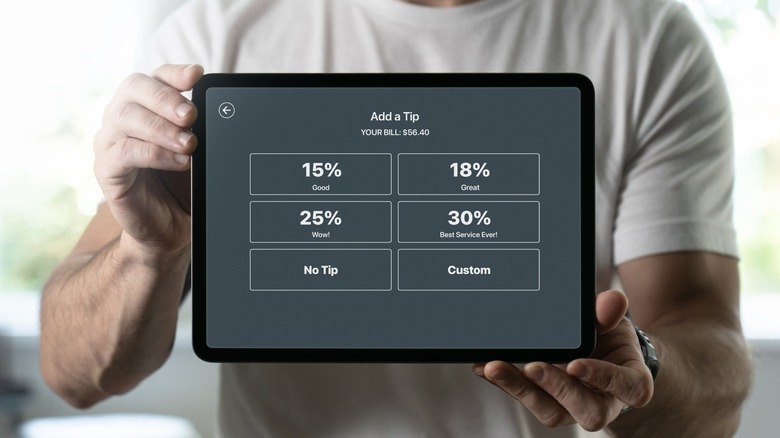Should You Be Tipping When You Eat At A Fast Food Restaurant?
Food service isn't for the weak, and fast food is no exception. You probably know someone who has worked in fast food at some point in their lives — recalling rude customers, fast-paced working conditions, and the occasional safety hazard, all for minimal pay. The federal minimum wage of $7.25 hasn't budged since 2009, yet restaurants have long used a loophole to go even lower because employers only have to pay tipped employees at least $2.13 to comply with the Department of Labor's Fair Labor Standards Act (FLSA). Much of the time, a worker's hourly pay will be above these amounts, but the real question is: Why does a service worker's paycheck rely on our tips instead of their employer's pay?
Tipping culture is a distinct part of how the U.S. food industry operates, but other nations don't share the same idea. In countries like Japan, leaving a tip would be considered strange or even impolite. It's a risk and reward system. Fast food workers put in a great effort to meet customer service and kitchen safety standards every day, just like any other restaurant. What sets them apart is that fast food labor falls under the federal minimum wage, not the tip-based wage, so you're not required to give them one. However, they are legally entitled to any tips you give them. It comes down to if you have the means and think it's the nice thing to do. If you're able to help someone out, why not give a little bit extra? Generosity goes a long way, especially in an industry with such a high rate of burnout.
How tipping culture affects fast food workers
Eating out can be expensive, and fast food prices have inflated over the years. After already stretching your budget for a treat plus taxes and additional fees, a tip can feel like an extra punch on top of the other expenses. It could be worse — imagine working hard to earn a tip as thanks for your service all to end up with zero extra dollars from it. Gratuity is a gamble. The National Restaurant Association indicates that waitstaff earns a median of $27 an hour in full-service restaurants. Tip work can mean you're averaging out at that comfortable benchmark, or it can mean you're barely staying afloat over the $7.25 mark.
If fast food employees were under the federal "tipped employee" status, they would lose their current hourly wage safety net. Unless the law changes, tipping will remain optional, but you can also help service workers without opening your wallet. Learn the best ways to order in a rush, don't order too close to closing time, know when to stack your plates, and be polite. Also, knowing how to tip on different types of payment is important, too. For instance, it's best to check the restaurant's policy if you plan on using a gift card for tipping.
Some fast food restaurants have digitized payment tablets that let you automatically select a percentage of your meal cost to add as a tip when you pay with your card. Other places may just have a tip jar. One thing you can always do to brighten someone's day is directly handing them some cash. Remember: Service workers are paid to do their best for you, and every penny counts.

